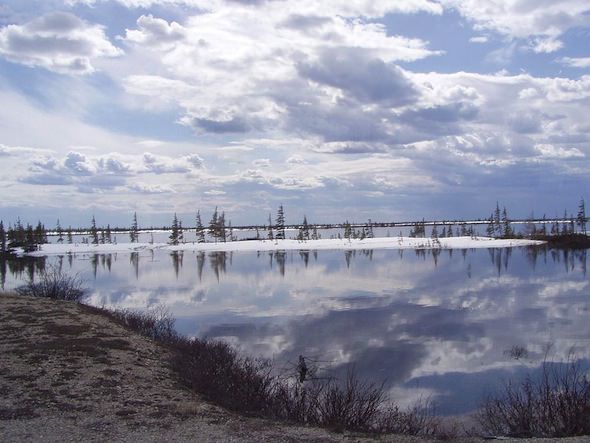Wetland Emissions Mean More Methane
Wetlands in northern latitudes are adding more to methane emissions than science had expected, a research team based in Canada has found.
By Alex Kirby, Climate News NetworkThis piece originated with Climate News Network.
LONDON — The bad news is that global emissions of methane appear to be rising. The worse news is that scientists believe there’s much more to come in the form of releases from many of the world’s wetlands.
Methane is emitted from agriculture and fossil fuel use, as well as natural sources such as microbes in saturated wetland soils. It is a powerful greenhouse gas, and in the short term it does much more damage than the far more abundant carbon dioxide.
Just how much more damaging it is is something scientists keep updating. There is now international agreement that methane is 34 times more potent than CO2 over a century, but 84 times more over a much shorter timespan – just 20 years. And two decades can be crucial in trying to slow the rate of climate change.
Professor Merritt Turetsky, of the department of integrative biology at the University of Guelph, Canada, is the lead author of a paper published in the journal Global Change Biology.
The paper is based on an analysis of global methane emissions examining almost 20,000 field data measurements collected from 70 sites across Arctic, temperate and tropical regions.
More to come
Professor Turetsky and her colleagues report that a recent rise in atmospheric methane probably stems from wetland emissions, suggesting that much more will escape into the atmosphere as northern wetlands continue to thaw and tropical ones to warm.
The study supports calls for improved monitoring of wetlands and human changes to them. It also urges better methods of detecting different types of wetlands and different methane release rates between flooded and drained areas.
The amount of atmospheric methane had remained relatively stable for about a decade, but concentrations began to rise again in 2007.
Scientists assumed that wetland methane release was largest in the tropics, said Professor Turetsky. “But our analyses show that northern fens, such as those created when permafrost thaws, can have emissions comparable to warm sites in the tropics, despite their cold temperatures. That’s very important when it comes to scaling methane release at a global scale.
“Not only are fens one of the strongest sources of wetland greenhouse gases, but we also know that Canadian forests and tundra underlain by permafrost are thawing and creating these kinds of high methane-producing ecosystems.”
Moisture the key
Most methane studies focus on measurements at a single site, said one of her co-authors, Narasinha Shurpali, from the University of Eastern Finland. “Our synthesis of data from a large number of observation points across the globe is unique and serves an important need.”
The team showed that small temperature changes can release much more methane from wetland soils to the atmosphere than scientists had believed. Whether climate change will increase methane emissions will depend on soil moisture, said Professor Turetsky.
Under warmer and wetter conditions, much more methane is likely to be emitted. If wetland soils dry out from evaporation or human drainage, though, emissions will fall – but not without other problems, like wildfires breaking out on drying peatlands.
Another study co-author, Kim Wickland, of the United States Geological Survey, said: “This study provides important data for better accounting of how methane emissions change after wetland drainage and flooding.”
She said emissions varied between those from natural wetlands and those from areas which had been disturbed or managed.
Your support matters…Independent journalism is under threat and overshadowed by heavily funded mainstream media.
You can help level the playing field. Become a member.
Your tax-deductible contribution keeps us digging beneath the headlines to give you thought-provoking, investigative reporting and analysis that unearths what's really happening- without compromise.
Give today to support our courageous, independent journalists.






You need to be a supporter to comment.
There are currently no responses to this article.
Be the first to respond.